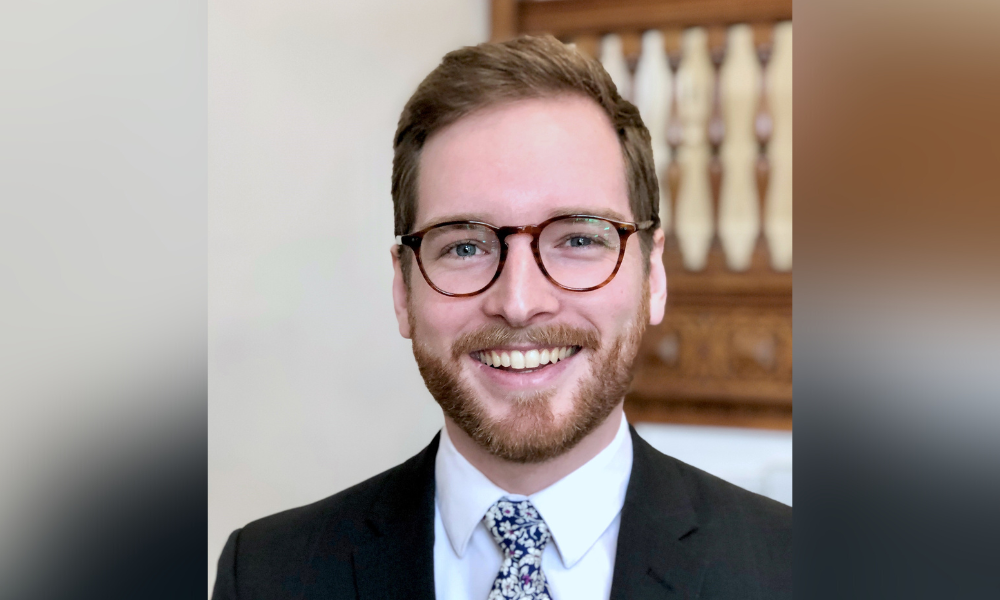
Courts should harmonize their practices so people can easily access online hearings: lawyer

The COVID-19 outbreak affected the operations and practices of the legal profession almost overnight, including the concept of open courts. In a soon-to-be-published paper, lawyer and University of Toronto doctoral student Jérémy Boulanger-Bonnelly examined how the closure of courthouses during the early days of the pandemic impacted the public’s ability to witness justice being served.
“The open court principle is that principle by which, as a member of the public, you can attend almost any hearing, sit in the courtroom, and listen to justice being made in real time,” says Boulanger-Bonnelly, a Pierre Elliott Trudeau Foundation and Vanier Canada Graduate scholar at U of T’s Faculty of Law.
Undertaking a systematic review of the policies and directives of courts in civil matters in Canada, Boulanger-Bonnelly found that the procedure to access online hearings was inconsistent within the courts, making it more difficult for public members to access online hearings in different jurisdictions.
“When the courts transitioned online, they each adopted very different approaches to preserving the open court principle in the online context.”
As the courts began to do online hearings, Boulanger-Bonnelly says members of the public did not have access to hearings anymore. “They [the courts] didn’t really know how to include the public and the technology, especially early on in the pandemic was not really made for that.”
He argues that courts should try to harmonize their practices to make it easy for people to access online hearings in different districts and jurisdictions.
“Imagine you’re a public member, and there’s one case that interests you in one district, and then the next day in another district, you have to go through different procedures and mechanisms to ensure you have access.”
Boulanger-Bonnelly also distinguished between trial and appellate hearings in his analysis.
He says trial hearings that are open to the public give rise more frequently to privacy and security concerns, but the risks are mitigated by the fact that most public members do not attend unless they have a personal interest in the case. Furthermore, judges can scrutinize those who do attend in person if necessary. By contrast, the shift to online hearings provided much greater ease of access but exacerbated privacy and security risks.
“When the courts gave out their links to everyone without any procedure, they didn’t really show proper concern for the privacy and security of people involved in the hearings,” Boulanger-Bonnelly says.
He says some measures are required to balance the open court principle with the protection of privacy online – for example, making sure that people have to register and give some information.
“Requiring attendees to fill out a basic form that can include personal information and an undertaking to abide by the rule of courts may help mitigate some of these risks.”
He says a reasonable solution is a practice by which the court remains open, and links remain readily available to anyone without having to justify their reasons for attending the hearing. However, the courts must recognize that it has to impose some limits online because of the heightened risks to privacy and security.
In the appellate court, where appeals on the trial decision are heard, hearings tend to be focused on questions of law and its application as opposed to the facts and evidence of a case, meaning there are fewer privacy and security concerns, Boulanger-Bonnelly says.
“I argue that appellate hearings should be all broadcast very openly, save exceptions,” Boulanger-Bonnelly says. “This would enhance the open court principle and I see no principled basis to restrict the accessibility of appellate hearings.”
Boulanger-Bonnelly, who will join McGill’s Faculty of Law as an assistant professor in the fall of 2023, says the Supreme Court of Canada already livestreams its hearings, but most appeal courts in Canada have work to do to make their hearings more accessible.
He says that public participation has the potential to improve access to justice, which is the focus of his graduate research.
“So far, the literature has focused a lot on costs and delays, which are important aspects of access to justice. My dissertation is focusing on the sense of alienation that people have when they go through the justice system, and the connection between our justice system and community at large.”
Boulanger-Bonnelly says the paper’s relevance goes beyond the pandemic because some courts have said that they will continue online hearings in some cases.
“Courts have to think about those practices for the future because online hearings are here to stay, so the courts’ guidelines and policies have to adapt to a context where we’re going to see that more in the next few years.”
At the federal level, Boulanger-Bonnelly says the Supreme Court, other judges, and the government are looking at issues related to online hearings, including transparency and hopes that the paper provides the conceptual framework to continue that discussion and adopt practices.
Boulanger-Bonnelly, who formerly practiced civil ligation, says there are dozens of examples around the world of institutions that allow ordinary citizens to contribute more actively to the administration of justice – not only as members of the public but even as judges in some types of disputes. His dissertation explores three examples: the lay magistrates of England and Wales, the justices of the peace of Colombia and, historically, the former lay courts of East Germany.
“More public participation would build closer connections between the public and the justice system,” Boulanger-Bonnelly says.